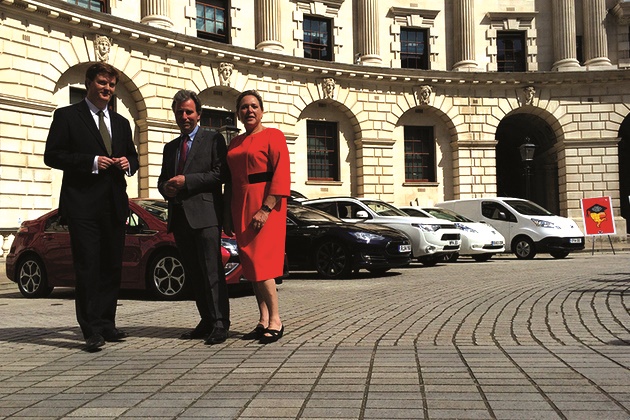01.08.14
Leading the electric charge: plug-in cars for government fleets
Source: Public Sector Executive Aug/Sept 2014
The government has announced £5m funding to ‘lead by example’ to introduce more electric cars and vans across its fleets. PSE interviewed transport minister Baroness Kramer.
All government car fleets, beginning with the Government Car Service, are to get funding to introduce plug-in cars and vans.
The £5m ‘Ultra Low Emission Vehicle (ULEV) Readiness Project’ is the first step to making electric vehicles “commonplace” in government fleets.
Baroness Kramer, speaking to PSE just after the launch of the scheme, which she attended with chief secretary to the Treasury Danny Alexander and Cabinet Office minister Oliver Letwin, said: “Government needs to lead the way, and we’ve got to look at our own fleet.
“We’re working with the Energy Saving Trust, who will do a review of the 20 central government departments, starting with the Government Car Service and with the Department for Transport.”
The Government Car Service, which provides cars for ministers, plans to order its first electric cars in the autumn.

Baroness Kramer said: “This scheme is about working with the departments to identify where ULEVs will work for them, given the very wide range now available, how they could work them into their fleets, what kind of savings they could make – all of those kinds of issues. Then we’ve said that for the first 24 months they lease the ULEV – because it’s essentially a leasing system in central government – we will cover the cost.”
“It’s to set an example, and it’s to save money,” she said. More than 150 plug-in vehicles will be added to government fleets in the first wave of the scheme, then it will be rolled out to the wider public sector – including councils, police forces and the NHS – which is expected to add approximately a further 135 plug-in vehicles to these fleets. More charge points will also be installed.
Value for money?
We asked Baroness Kramer how confident she is that the £5m for the government fleet aspect of the scheme will prove to be good value for money, rather than just environmentally symbolic.
She said: “We would never have squeezed a penny out of the Treasury if they weren’t convinced of it. I’m hesitant to give you numbers now, because we need to do this detailed review of each department.
“It will be as the cars are rolling naturally out of service – it’s not about [telling departments] ‘We’ll suddenly turn your whole fleet over x number of years early’.
“It’s going to be a case of, as vehicles are replaced, let’s ensure that we’re taking advantage of ULEVs and their much lower running costs. The difference between running a car on petrol and running a car on the electric charge is, obviously dramatic – and the only difference is the upfront cost. As we’re getting more and more cars coming onto the market, there’s a point at which economies of scale are such that we’ll reach the tipping point – that problem [of relatively high upfront cost] will eventually take care of itself.”
Go Ultra Low
The fleet scheme is just one part of the government’s much wider push on ULEVs and its support for the Go Ultra Low campaign.
Baroness Kramer told us: “We have a big push to encourage people to look at ULEVs before they make their next car purchase decision because we think very often, the ULEV is going to be the right decision for them, with what it has to offer in terms of the type of car and the whole life cost of the car – it will be significantly lower cost over the whole of its life.
“We want people to take a look. By 2040, virtually all new cars in the UK will be ULEVs. We’ve made that decision partly for climate change reasons, but it also has a big knock-on effect with air quality. One of the reasons we really want to make people aware of is that it’s 2p a mile to run these things: that is a significant advantage as well.”
The government has promised £500m of new capital investment between 2015 and 2020, on top of £400m allocated through to 2015 and a £500m contribution towards a new advanced propulsion centre.
This supports the Plug-in Car Grant, which takes £5,000 off the cost of the car (costing £200m), and provides 75% of the cost of installing domestic charge points (£13.5m to September 2014, £9m for the successor scheme with a lower £900 rather than £1,000 cap).
Baroness Kramer added: “We’re setting in place a whole network – much of it already in place – of public charge points. We’re working with cities on strategies they can use on this, with buses, taxis and so on. There’s a whole strategy out there.”
The rest of the £500m is for R&D (£100m), £35m for the cities scheme, £20m to encourage ULEV taxis, £30m for ULEV buses, and £32m for public chargepoints.
The Department for Transport said: “Cars and vans will be recommended on a like-for-like basis and the reviews will consider the whole life cost of the vehicles to ensure that each replacement makes economic sense. ULEVs will be a major area of future growth for the hugely successful UK automotive sector, worth over £11bn to the economy.”
Tell us what you think – have your say below or email [email protected]